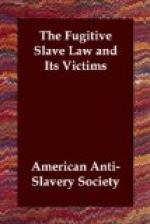by several Kentuckians, who attempted to search
the houses of several of the citizens. “The
people, indignant at this outrage, assembled
with arms, and placed an injunction upon these
summary proceedings.” “The men-hunters
then offered $2,000 to any traitor who would betray
the fugitives into their hands. But, so
far as we have learned, the bribe was as unsuccessful
as the attempted search.” (November,
1855.)—Carroll Free Press.
At Wilson’s Corner, Bensalem, Buck’s County, Pa., Dec. 13, 1855, a colored man in the employ of John Henderson was seized by three men, who tied him, threw him into a wagon, and drove off at full speed. They were seen, and quickly followed by men on horseback. After two hours’ hard riding, the kidnappers were overtaken. A fight ensued—the black man was released; when three pistol-shots were fired by the kidnappers, killing a horse, and wounding one of the rescuing party severely. A statement of the facts was published, as an advertisement, in the Philadelphia Ledger, signed by William Williams and John Henderson.
“Two very bright mulatto girls,” says the Staunton (Va.) Spectator, “one belonging to Mr. John Churchman, and the other to the estate of Colonel Crawford, deceased, took the cars at Staunton, on the morning of December 30, 1855, and made their way successfully to Baltimore, en route for a free State. At Baltimore they were detected just as they were about to take the train for Philadelphia, and information of their arrest was immediately forwarded to D. Churchman, of this place.” On the following Friday they were taken back to Virginia. “They were so nearly white that their success in imposing upon the conductors of the cars is not astonishing, and the only wonder is that they were detected at all. Since their return, the negro girls have been sold—Mr. Churchman’s for $1,050, and the other for $950.”
FANNY, a colored child of fire years old, was taken from Chicago, Illinois, into Tennessee, and sold for $250. A man named F.M. Chapman, with his servant William R. Tracy, were arrested as the kidnappers, and taken before Justice DeWolf. Chapman claimed to have owned the child in Arkansas, and to have brought her to Illinois [thereby making her free.] He procured Tracy to take the child to Tennessee and sell her. The result of the case not known. (January, 1856.)
Two fugitives, passing through Ohio, (January, 1856,) were closely pursued and nearly overtaken at Columbus, Ohio. “Ten minutes previous warning only saved the fugitives from their pursuers.” Deputy Marshal J. Underwood, being called on to act in the case, refused, and resigned his office, saying, he did not expect to be “called upon to help execute the odious Fugitive Slave Law.”—Cincinnati Commercial.
[—> The following may, not improperly, find a place here.]




